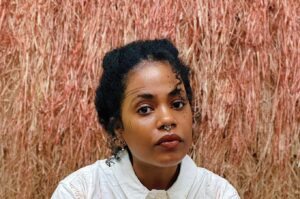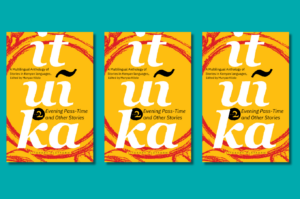The Girl Who Smiled Beads: A Story of War and What Comes After is a devastating, beautiful memoir of Clemantine Wamariya’s survival of the Rwandan Genocide of 1994. The book, released by Penguin Random House on 24 April, 2018, is co-written with Elizabeth Weilis, a writer-at-large for The New York Times Magazine. It follows Wamariya from six years of age as she and her 15-year-old sister flee the genocide, spend six years migrating through seven African countries, before being granted refugee status in the USA, where she is taken in by a family and graduates from Yale.
*
One day my mother told me and my older sister Claire to pack a few things to go to my grandmother’s farm in Butare, a few hours south of Kigali, toward the Burundi border. Claire and I loved it there and we revered our grandmother. She lived in an adobe-style house with small windows, a thatched roof, and rows and rows of sunflowers behind it—a house out of a fairy tale.
A man arrived in a van early the next morning. It was still dark. We stopped at other houses; other girls entered. We all squished together in the middle of the seats, away from the windows. We rode up and over the hills, the curved slopes soft, like a body, past the stands of trees, the rice paddies. When I tried to speak, Claire insisted we play the silent game.
In Butare, when we arrived, some of my cousins were already in my grandmother’s kitchen. Every hour I demanded an update on when my parents were coming, or at least my brother, Pudi. I missed him. My grandmother, cousins, and sister all just said, “Soon.” Nobody would play with me.
We heard a knock on the door. My grandmother gestured for us to be silent—checkeka checkeka. Then she motioned for us to run, or really to belly-crawl, out past the sunflowers and through the sweet-potato field. Claire pulled my arm. The earth felt soft and lumpy, a bucket of broken chalk. Once we reached the tall trees we ran, for real, off the farm and deep into a thick banana grove, where we saw other people, most of them young, some of them bloody with wounds.
We walked for hours, until everything hurt, not toward anything, just away. We rubbed the red-brown mud and eucalyptus leaves on our bodies so we could disappear. We heard laughing and screaming and pleading and crying and then cruel laughing again. We avoided roads and walked instead only on the little paths animals used to pass through the scrub. If we heard any noise we crouched and froze.
Claire’s face—I’d never seen anything like it. I couldn’t look at her eyes. We stopped and knelt by a stream to drink. I started to shiver, and said, “I want to go home.” Claire stood up, pulled my wrist. “We can’t stay here. Other people will come.”
A man told us he knew the way to safety. We followed him to the Burundi border, at the Akanyaru River. There were bodies floating in it. I still didn’t understand what killing was. To me, the people in the river were sleeping. People in water sleeping and sleeping. That’s all I knew.
My toenails fell out. We lived on fruit. Days were for hiding, nights for walking. I thought I was 100 years old. I thought I was the thunder’s child. I had always wanted to be Claire’s age or my mother’s. I was six. Age made no sense anymore.
After days, a week—I could not keep track—we found a cornfield where we heard children playing. Claire and I exchanged no words. Our mouths, our bodies, had gone mute. Only our eyes still could speak and even then only in bursts. I could see, and then I stopped seeing.
It’s strange how you go from being a person who is away from home to a person with no home at all. The place that is supposed to want you has pushed you out. No other place takes you in. You are unwanted, by everyone. You are a refugee.
One day a Red Cross truck arrived. The authority felt reassuring. The driver invited pregnant women and the wounded to sit in the back. He told the rest of us to follow on foot. We were just a mass, a herd. We walked for almost a whole day before we reached Ngozi, two hills covered with blue and white tents. We were given a tent, two water jugs, two scratchy blankets, a large plastic bag, and a pot.
Staying alive was so much work. We had to wait five hours in line for maize and five hours again for beans. We had to fetch firewood. No one had matches, so you had to look out for smoke, and when you saw some you walked over there, with some kindling, to carry the flames back to your tent.
You had to try to hang on to your name, though nobody cared about your name. You had to try to stay a person. You had to try not to become invisible. If you let go and fell back into the chaos, you were gone, just a number. If you died, no one knew. If you got lost, no one knew. If you gave up and disintegrated inside, no one knew. I started telling people, I’m Clemantine, I’m Clemantine, I’m Clemantine! I don’t want to be lost. I’m Clemantine! I thought if I stated my name enough times, my identity would fall back into place. I wrote my name in the dirt. I wrote my name in the dust. But a name is a cover, a placeholder, not the whole story. A name is a basin with a leak that you need to constantly fill up. If you don’t, it drains and it’s just there, a husk, dry and empty.
Two years later. Fleeing Kazimia, in the Democratic Republic of Congo, required not just traveling along the shore of Lake Tanganyika but crossing it, a six-hour trip. Claire, by that point, had married Rob, an ex-aid worker who had fallen in love with her at the refugee camp. Now 50 frantic people, including one of Rob’s cousins, crammed with us into a small boat. We carried our whole lives—or what we had left. Rob’s cousin had lost a baby a few months before. Malaria, no medicine. A natural disaster with a war assist.
We started taking on water as soon as we left. The only way to slow our sinking was to make our boat lighter, to trade possessions for lives. So people began dropping heirlooms—framed pictures, silver, jewelry—into the water and watching them disappear. The looks on their faces, the look of panic. It’s easier to scream, but if you scream you’ll get shot, and what’s the point if everyone is screaming with their faces already? One woman tossed her china plates, one by one; then she started on her glass teacups. Still, the cold water kept rising, creeping up the adults’ shins, over my knees.
I prayed like my mother had prayed, to every saint that I could remember—Mary, Rose, Katherina. I didn’t want the kids on the boat to die like this. I promised if we got out, I would be the best child ever, the best sister.
The water was a monster. Claire held her baby, Mariette, then eight months old, up to her chest. The moon was full. I willed myself to be light as air, to atomize and scatter in the wind. Water crept up to my waist. No one said a word.
We reached Tanzania catatonic and exhausted. The boat pulled right up to the beach. Steep hills rose just 20 feet from the water’s edge, so we fell asleep on the cold sand. We had nothing. Rob’s cousin had left Zaire with one bag. In that bag was her whole remaining life—all her money, her husband’s college diploma. It disappeared overnight, while she slept.
The next morning, immigration police rounded us up and we resumed being refugees. We spent the night at a nearby school. I wrapped Mariette in our one blanket, then put her inside our one remaining suitcase to keep warm. All night, in the suitcase, Mariette remained silent. All the children with us in the school had stopped crying. Only the adults wept. The next day we rode one of those godforsaken white UNHCR trucks to a refugee camp in Kigoma.
Four years later. People holding “Welcome to America” signs at Chicago O’Hare airport were walking toward us. I was twelve. Claire was 21. We stood erect and dazed as a bright white couple hugged the five of us: me, Claire, Rob, Mariette, age four, and Freddy, age two. The couple had balloons for Mariette, Freddy, and me, the supposed children. They gave Claire and Rob $100 gift cards for Old Navy.
Claire and I had lived in six different countries since leaving Rwanda. The United States was our seventh. I was callous and cynical. I didn’t trust kindness; I believed it came with a price. I thought I could fool people into thinking that I was not profoundly bruised. We just stared at our hosts—a middle-aged Germanic woman with short, curly blonde hair and her skinny husband. They held a paper with our names. Their car smelled new. Their shampoo smelled like plumeria. There was so much concrete. I hadn’t seen my mother in six years.
My eighth-grade English teacher at Christian Heritage Academy put genocide on a vocabulary list. I hated the word immediately. I did not understand the point of it then. I resent and revile it now. It is tidy and efficient. It holds no true emotion. It is impersonal when it needs to be intimate; cool and sterile when it needs to be gruesome. It’s hollow, true but disingenuous, the worst kind of lie. The word genocide cannot tell you, cannot make you feel, the way I felt in Rwanda. The way I felt in Burundi. The way I wished to be invisible because I knew someone wanted me dead at a point in my life when I did not yet understand what death was.
“Oh, it’s like the Holocaust?” people would say to me—say to me still. To this day I do not know how to respond. No, I want to scream, it’s not like the Holocaust. Or the killing fields in Cambodia. Or ethnic cleansing in Bosnia. There’s no catchall term that proves you understand. You cannot line up the atrocities like a matching set. You cannot bear witness with a single word.
Read the full excerpt in Vogue.









COMMENTS -
Reader Interactions